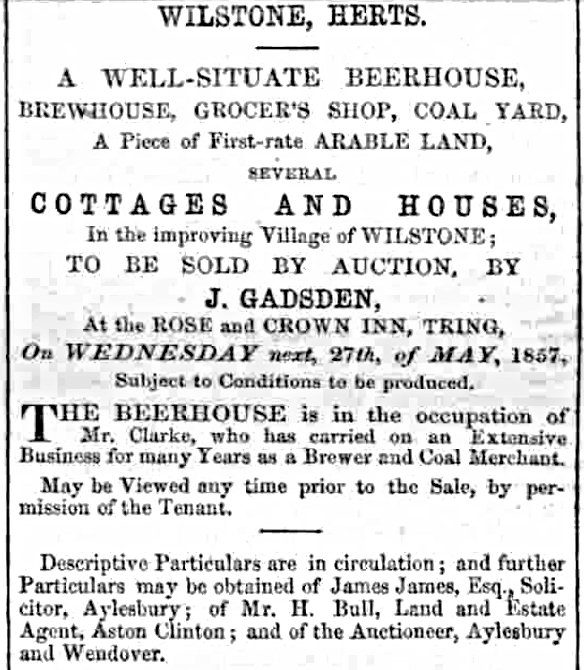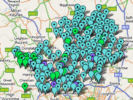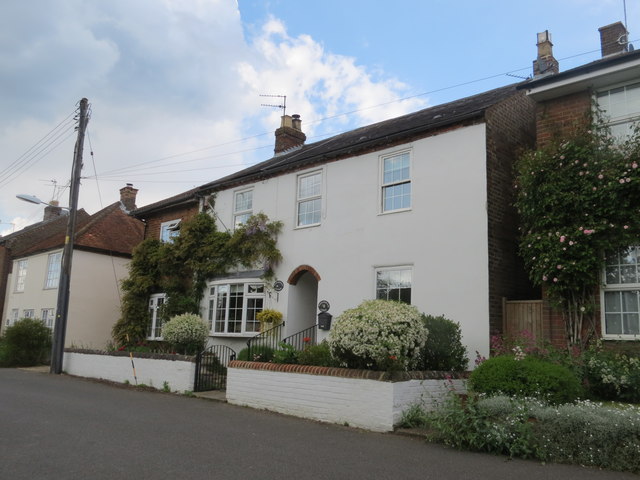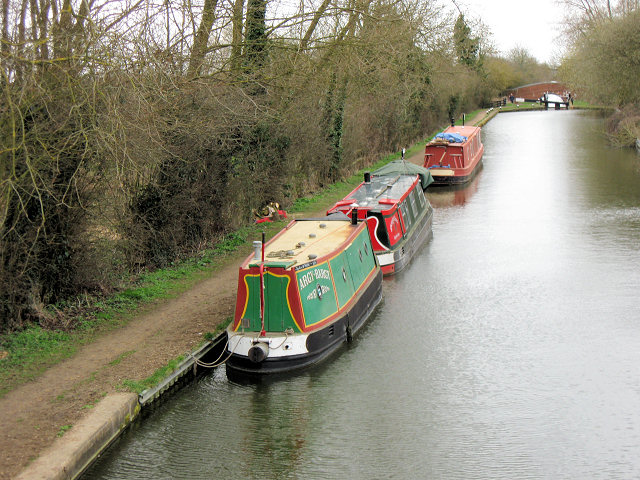|
Thomas Clark of Wilstone |
|
Notes on entries in William Brown's Account Book
|
Work in Progress Any comment you have would be welcome |
if you can supply details (and possibly scans) of other Hertfordshire post cards they produced. |
The former Brickmaker's Arms in 2016
For many years Thomas Clark ran a successful business at the Brickmaker's Arms, Wilstone, with a brew house, coal yard and grocer's shop. He clearly had some financial problems as in November 1853 he faced a debt of £68 12s 3d. as a result of a civil court ruling under the title Shields v Clark.
.jpg)
I have not been able to trace the court case, or who Shields was, but it may have been from outside the area, such as the coal mine which supplied the coal in his coal yard. To clear his debt Thomas decided to sell at least some of his property and commissioned William Brown to sell it.
.jpg)
There were various meetings in connection with the sale and the Mr Healey was probably a London Solicitor who had travelled to Tring by train to meet the interested parties. Sales particulars were prepared, the sale advertised and an auction was held in the Commercial Hall, Tring. No satisfactory bid was received and the lot was "brought in.
.jpg)
.jpg)
William Brown then arranged a private mortgage with a Mr Puddephatt. There were further expenses to pay, including another debt to Mrs Northwood (matching entry on folio 89) and Mr Faithfull's solicitor's bill (matching entry on folio 86):
.jpg)
Thomas Clark ended up with £34 17s 5d cash (Cash to you on account £20 plus Cash to you to balance £14 17s 5d)
By September 1854 he was again defaulting on his debts and after a write was issued Thomas agreed to sell some of his personal effects (possibly household furniture, etc.)
.jpg)
The items sold only fetched £26 3s 9d which was insufficient to clear the debt and associated expenses. At the same time other people were anxious that their bills were paid as can be seen from the following news item which appeared in the Bucks Herald of 25th November, 1854
Edward Terry, Brewer, Aylesbury v. Thomas Clark, Beerseller, Wilstone. - Claim for £11, for beer supplied. Defendant admitted the debt. Ordered to pay forthwith. Mr Henry Griffits for plaintiff.
As there was still money owing Thomas worked to pay off the balance of the debt on the William Brown account, by demolishing and building a shed at Puttenham and supplying 100 loads of gravel.
.jpg)
This work was done for the Rev James Williams of Tring Park as folio 239 has the following entry:

This work was sufficient to pay off the relevant debt and leave Thomas Clarke with £8 1s 7d cash.
.jpg)
However Thomas Clark's financial problems continued as he failed to pay the the interest on the mortgage in January 1866 & 1867
.jpg)
Things had clearly gone too far and the Wilstone property was auctioned by J. Gadsden at the Rose & Crown, Tring, on 27th May, 1857. It is interesting that the sale treats Thomas as a sitting tenant, rather than the former owner, and there is no indication that the courts have authorised the sale - suggesting that everything was arranged with the agreement of Thomas (who had co-operated earlier) and the holders of the mortgages on the property.

It seems possible that the property did not sell in May, leaving the debts unsettled, as the following entries are dated the 24th October, although the 5 month delay may be purely administrative. The situation is more complex because William Brown was not the Auctioneer but the This shows that that the purchasers were William Brown and Edward Newens. William Brown may have brought the beer house on his own account or on behalf of his brother, John Brown, who owned the Tring Brewery.
.jpg)
It is not clear whether William Brown brought the beer house on his own account or on behalf of his brother, John Brown, who owned the Tring Brewery. However the Buckinghamshire Alms (as the beer house was renamed) was one of the properties taken on by Locke & Smith, of Berkhamsted when Tring Brewery closed in 1898.
.jpg)
Poor Thomas Clark seems to have lost out because the sale was not completed rapidly. If the account had been wound up at the end of June the final bill would have been less. There would have been no need for a writ (cost £5 4s 8d) or a levy and conveyance to goal (£3 14s ). He would had saved about £2 5s on interest due to Puddephatt, and possibly about £5 interest to Mrs Bennion. As a result the account ended
.jpg)
and he ended up in a debtor's prison, when if the account had been closed in June it could have ended up paying Thomas a little over £2. It seems very likely that Thomas and his family expected the money raised in the sale to cover his debts and Edward Newens (Thomas's son-in-law) may well have expected his contribution to save Thomas from prison, and in the circumstances I would expect the family would have quickly rallied and got him back to Wilstone.
In fact I wonder if there was a bit of skulduggery going on. The sales particulars treated Thomas as if he would continue at the pub as a tenant. William (and his brother John Brown of Tring Brewery)would have been well aware of Thomas's problems with money and I am sure would want to find a more reliable pub landlord. What better way to get Thomas out of the building that to get Thomas sent to prison ... ...
People Mentioned.
Mrs Bennion could well be Mrs Ann Bennion, of Castle Street, Aylesbury, who is listed as a 60 year old widow and "house proprietor" in the 1851 census and wife of Thomas Bennion, miller, of the Mill, Stoke Mandeville, in the 1841 census.
John Brown, Tring Brewery, Brother of William Brown.
Henry Faithfull, Solicitor, Tring
Mr Healey, probably a London solicitor
J. Gadsden, Estate Agent, Aylesbury and Wendover
Mrs Sarah Northwood
James James, solicitor, Aylesbury
Edward Newens family were associated with Betlow Farm (in the very north of the Tring parish) and in 1861 he was a cattle dealer living in Wilstone. In 1843 Edward (24 year old cattle dealer, son of Edward Newens, grazier) married an Elizabeth Clark, (born Wilstone, daughter of Thomas Clark. Wharfinger), at Tring. The question arises as to whether Elizabeth was the daughter of Thomas Clark. If the connection is correct Elizabeth had a brother William (1841 census) and in 1847 William, son of Thomas Clark, coal dealer, married Mary Mead at Marsworth. [Susan]. While the occupation of wharfinger may seem surprising coal was probably shipped to Wilstone - where there would have been a wharf on the Aylesbury Arm of the Grand Union Canal. SO a coal dealer with easy access to a canal could also have traded as a wharfinger.
Probable location of Wilstone Wharf
The identity of "Puddephatt" who put up the mortgage is far from obvious. However the name is very localised (and with several different spellings) in and around nearby Chesham, a few miles away with quite a few individuals with sufficient status (mainly farmers) to be listed in the 1854 trade directory for Buckinghamshire.
It is far from clear who Shields, in the case Shields v Clarke was - as an initial search shows no local candidates. However if Thomas was a coal dealer it may relate to the purchase and transport of coal - which would have had to come from a long way away. It way be a coincidence but one large coal mining area was at North Shields.
Edward Terry, Brewer, Aylesbury
Rev. James Williams, Tring Park
Sources
In addition to references to the Genealogy in Hertfordshire web site the following sources were widely searched and used of genealogy and newspaper information.: ANcestry, FindMyPast, FreeBMD, British Newspaper Archive
Information supplied by Susan Aucoin Clark-Williams.
| May 20163 | Page Created |






.jpg)
